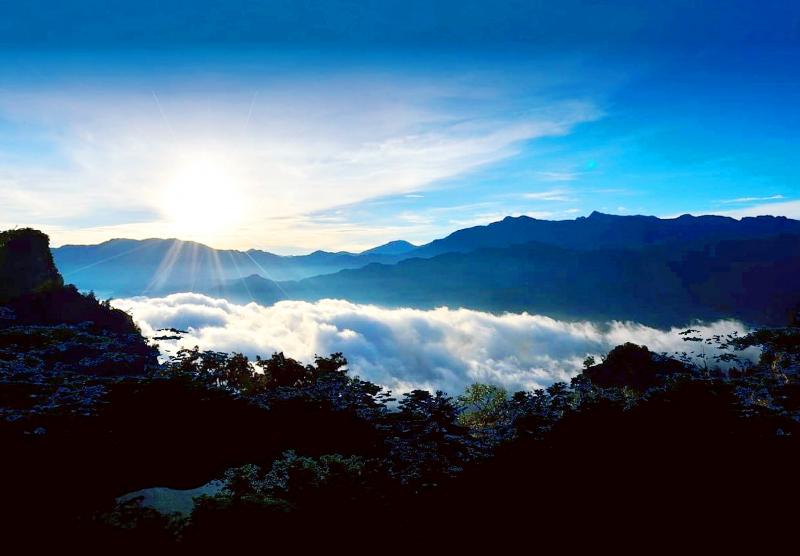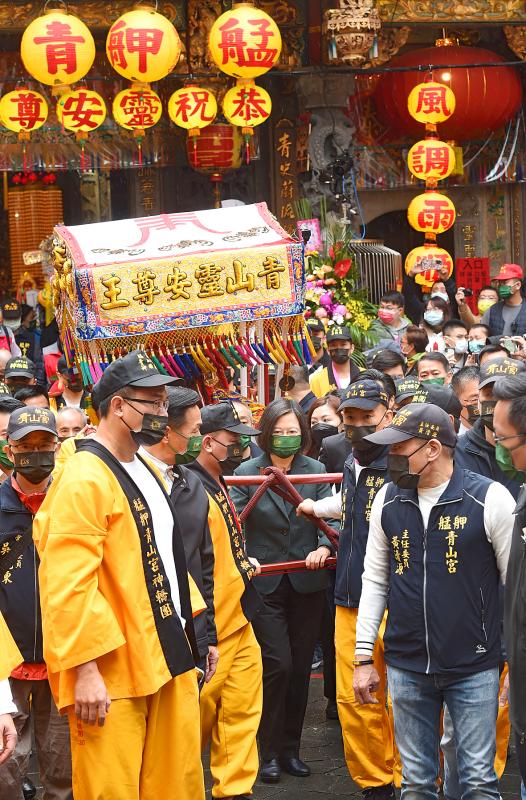One of the most delightful developments of the last decade has been the emergence of a whole continent of English-language commentary on Taiwan, rising from the sea like the island itself, along with major changes in the commentary ecosystem.
In the early 2000s, there wasn’t a whole lot out there, outside the mainstream media pieces and occasional long-form thinkpieces in magazines, and what was there was largely male. There were few female writers aside from a number of very good reporters.
PLURALITY OF VOICES

Photo courtesy of the Chiayi County Government
Today, by contrast, we have a wealth of skilled and informed female journalists, commentators and writers including Clarissa Wei (@dearclarissa on Twitter), who writes on food and history, Jessica Drun (@jessicadrun), who writes on international relations, Catherine Chou (@catielila), who writes on identity and the Taiwanese diaspora, Jenna Cody (@laorenchanna) of the blog Lao Ren Cha and Kathy Cheng (@trickytaipei) of the blog Tricky Taipei.
Because of the troubles with China, Taiwan has also been blessed with new journalists like Helen Davidson (@heldavidson), who writes for the Guardian. Taiwan’s international scholar programs have always cultivated talent for the island like freelancer Erin Hale (@erinhale) and Sana Hashmi (@sanahashmi1), who has done yeoman work writing on and promoting India-Taiwan relations. We are also home to a rising constellation of European thinkers and writers who work in multiple languages, raising our profile back home.
When I first argued that Taiwan needed to move closer to India in the local English papers in the late 1990s, India was hardly a blip on the radar here. Seeing Hashmi’s work to bring the two nations closer together has been the realization of a personal dream.

Photo: Liu Hsin-de, Taipei Times
BROAD RANGE OF TOPICS
Hashmi’s success also brings up another way that commenting on Taiwan has expanded: many erudite and passionate people with specializations are covering a far wider range of topics. Drun may write on policy, but on Twitter she’s the go-to person for people making errors describing US-Taiwan policy. Tricky Taipei comments cogently on marketing. Singaporean Roy Ngerng (@royngerng) has written insightfully on the topics of wage stagnation and labor issues, among the many things he covers. Scholar Nathan Batto writes on politics and polls at the blog Frozen Garlic. Greg McCann, a Taiwan-based environmental scholar and camera trapper in Southeast Asia, writes on Taiwan’s fauna and the environment.
WEB SITES, ONLINE ’ZINES, PODCASTING, VLOGGING
Also appearing in the last decade has been a whole ecosystem of Web sites that distribute articles and information on Taiwan. Online magazines such as the Diplomat and the National Interest offer new venues for all the new voices.
A heap of Web sites like Warontherocks.com also offer commentary on Taiwan. Taiwan Sentinel was an early Web site with a range of articles on Taiwan affairs. New Bloom offers a rare voice from the left, and Ketagalen Media and the News Lens provide new homes for excellent writing.
In tandem with this is a range of news aggregators and commentary sites, such as Taiwan Report.
Podcasting and vlogging has also exploded. Before 2010 there were a handful of podcasts on Taiwan, but few lasted long. Now readers can listen to Nate Maynard (@N8MAY) comment on the environment at the Waste Not Why Not podcast. Ghost Island media (@ghostislandme) is a widely respected podcast on the nation’s politics and history. Felicia Lin’s Talking Taiwan podcast is going strong after 150 episodes. Courtney Donovan Smith (@donovan_smith) hosts a regular podcast on Taiwan politics at Taiwan Report.
KEEPING IT GOING
So many voices, too many to list. But so much still to do.
First, we need a financing structure. One powerful reason that so many of these places flare briefly and then vanish like fireflies on a dark hill is money. I have seen this many times. Many who write or podcast or blog outside of academia does it as a hobby and have an unrelated full-time job. This means that useful commentary on Taiwan exists in a permanent state of existential precarity.
Second, while periodically there are pieces on Aboriginal issues in English, no one is doing that regularly in the accessible local media, especially on current issues (history is very well-represented). It would be great to see a regular column on that, and pieces in some of the English-language magazines overseas, to raise awareness of Taiwan’s indigenous issues and help forge links with indigenous peoples elsewhere.
US LEFT FAILS TAIWAN
The recent appearance on the US television network Fox News of Enes Kantor, the NBA player from Turkey who has been critical of China and supportive of Taiwan, is a reminder that our vocal support overseas comes largely from right-wing media. This is a problem not because it is bad to have support from the right, but because the left has failed colossally on Taiwan: there isn’t a diversity of left voices that we see on the right. People like Kantor who appear on right-wing media seem like a big fish because he is in a small pond. What we need to be doing is enlarging the pond, not killing its fish.
Although many of us who write and talk about Taiwan are on the left, the left outside of Taiwan remains a territory that we have neglected to cultivate. We don’t have the universe of progressive commentators that parallels the extensive and talented group of writers on Taiwan located in right-wing organizations such as the American Enterprise Institute.
Taiwan is too important an issue to be ceded to one side of the political spectrum. It’s good to have loud pro-Taiwan voices on the right, but this creates the danger, always latent in domestic politics in places like the US, Australia and Japan, that Taiwan will gradually come to be perceived as a right-wing issue, triggering reflexive opposition from the left. That would be a disaster for Taiwan.
Those of us who write and talk on Taiwan thus need to think about how to engage with the left and its venues, and how to get them to engage with us and with Taiwan.
But looking back at the last decade of change in the Taiwan commentary ecosystem, it seems a good bet that we’ll find a way.
Notes from Central Taiwan is a column written by long-term resident Michael Turton, who provides incisive commentary informed by three decades of living in and writing about his adoptive country. The views expressed here are his own.

Taiwan has next to no political engagement in Myanmar, either with the ruling military junta nor the dozens of armed groups who’ve in the last five years taken over around two-thirds of the nation’s territory in a sprawling, patchwork civil war. But early last month, the leader of one relatively minor Burmese revolutionary faction, General Nerdah Bomya, who is also an alleged war criminal, made a low key visit to Taipei, where he met with a member of President William Lai’s (賴清德) staff, a retired Taiwanese military official and several academics. “I feel like Taiwan is a good example of

March 2 to March 8 Gunfire rang out along the shore of the frontline island of Lieyu (烈嶼) on a foggy afternoon on March 7, 1987. By the time it was over, about 20 unarmed Vietnamese refugees — men, women, elderly and children — were dead. They were hastily buried, followed by decades of silence. Months later, opposition politicians and journalists tried to uncover what had happened, but conflicting accounts only deepened the confusion. One version suggested that government troops had mistakenly killed their own operatives attempting to return home from Vietnam. The military maintained that the

Before the last section of the round-the-island railway was electrified, one old blue train still chugged back and forth between Pingtung County’s Fangliao (枋寮) and Taitung (台東) stations once a day. It was so slow, was so hot (it had no air conditioning) and covered such a short distance, that the low fare still failed to attract many riders. This relic of the past was finally retired when the South Link Line was fully electrified on Dec. 23, 2020. A wave of nostalgia surrounded the termination of the Ordinary Train service, as these train carriages had been in use for decades

Lori Sepich smoked for years and sometimes skipped taking her blood pressure medicine. But she never thought she’d have a heart attack. The possibility “just wasn’t registering with me,” said the 64-year-old from Memphis, Tennessee, who suffered two of them 13 years apart. She’s far from alone. More than 60 million women in the US live with cardiovascular disease, which includes heart disease as well as stroke, heart failure and atrial fibrillation. And despite the myth that heart attacks mostly strike men, women are vulnerable too. Overall in the US, 1 in 5 women dies of cardiovascular disease each year, 37,000 of them